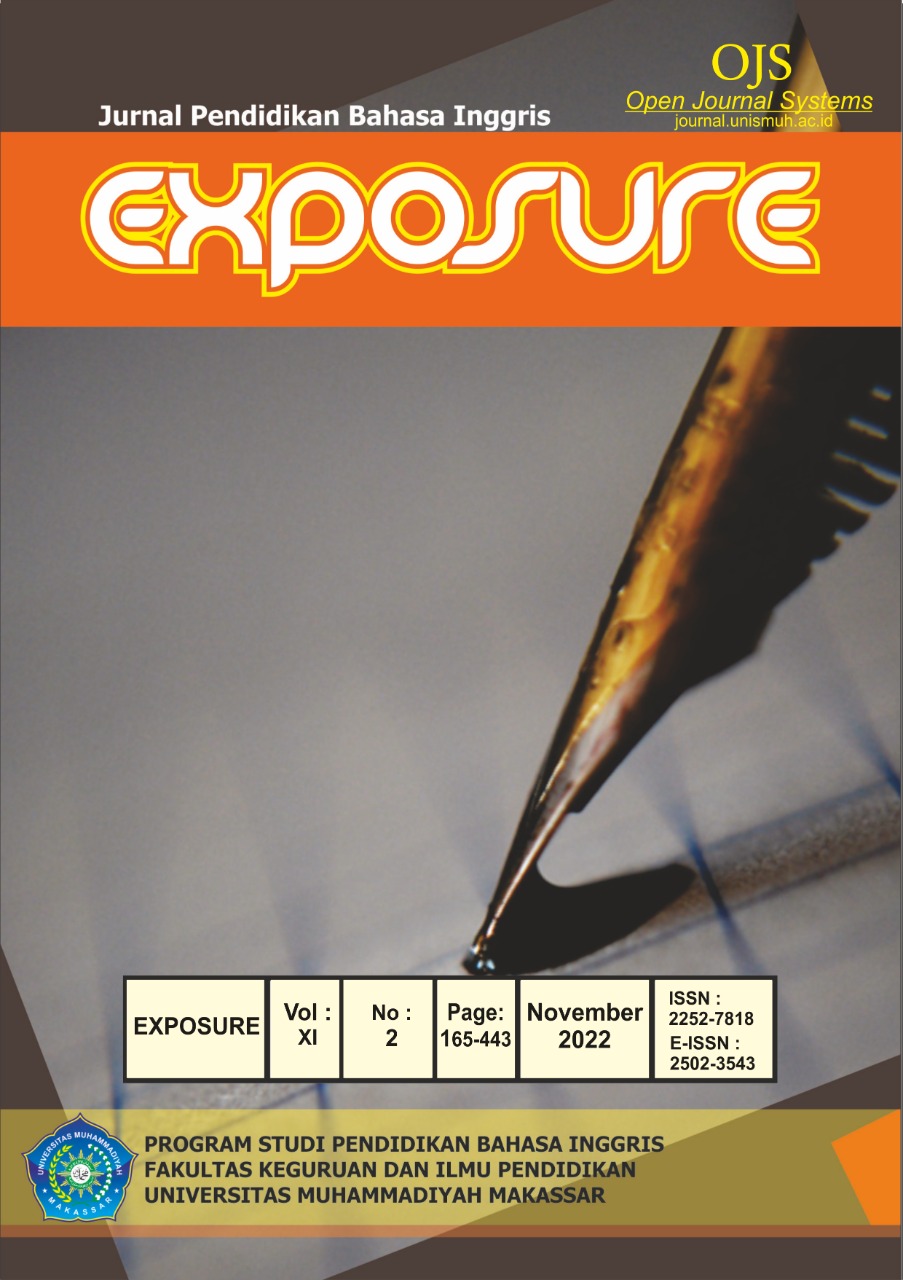RHETORICAL FACTORS IN SPEECH COMPOSITION ON NOVICE GRAND FINAL NATIONAL UNIVERSITY DEBATE CHAMPIONSHIP (NUDC) 2020 – 2021
DOI:
https://doi.org/10.26618/exposure.v11i2.8644Kata Kunci:
Rhetorical Factors, Speech, Debate, NUDCAbstrak
Rhetorical factors in speech composition is an essential element, it is make speech organized and effective. However the most difficult part of speech in debate match is the speeches delivered by each other debater can be accepted logically and clearly both from the july and audience. The objectives of this research to find out the rhetorical factors in speech composition in building speech of debaters on novice grand final NUDC and for the subject of this research are deabters from novice grand final NUDC 2020 – 2021. Rhetorical factors in speech composition consists of 4 components, such as : coherence, unity, emphasis, ethical and inclusive of language. The result show that the debaters on novice grand final NUDC 2020 – 2021 used all component of rhetorical factors in speech, they delivered at the debate match. This implies that the rhetorical factor in speech composition is very important in speech to build strong and believable arguments, especially in developing the style of language in speech itself, it is suggested that in order to be able to make a good rhetorical in speech, so speech can be more organized and effective.
Referensi
Ananda, R. P., Arsyad, S., & Dharmayana, I. W. (2018). Argumentative features of international english language testing system (Ielts) essays: A rhetorical analysis on successful exam essays. International Journal of Language Education, 2(1), 1–13. https://doi.org/10.26858/ijole.v2i1.4768
Chetty, N., & Alathur, S. (2018). Hate speech review in the context of online social networks. Aggression and Violent Behavior, 40(April), 108–118. https://doi.org/10.1016/j.avb.2018.05.003
Ikawati, Y. (2018). The Realization of Spoken Text Features in a Debate of Indonesian Students of World Schools Debating Championship 2017. 8(3), 342–349.
Noermanzah, Wahyuni Selbi, Astuti Tri, Wardhana Dian Eka Chandra, & Syafryadin. (2020). The Rhetorical Structure of the Lubuklinggau Mayor’s Speech in Building Community Trust. International Journal of Progressive Sciences and Technologies (IJPSAT, 19(2), 146–154. http://ijpsat.ijsht-journals.org
Nurcahyo, R., Aruan, D. angelina, & Aryana, I. N. rajin. (2021). BUKU PEDOMAN National University Debating Competition (NUDC) (F. Fitriana & L. Amalia dewi, Eds.; 1st ed.). Pusat Prestasi Nasional Kementerian Pendidikan dan Kebudayaan.
Samsu. (2017). Metode penelitian: teori dan aplikasi penelitian kualitatif, kuantitatif, mixed methods, serta research & development. In Rusmini (Ed.), Diterbitkan oleh: Pusat Studi Agama dan Kemasyarakatan (PUSAKA) (1st ed.).
Sidiq, U., & Choiri, Moh. M. (2019). Metode Penelitian Kualitatif di Bidang Pendidikan. In M. A. dr.anwar Mujahidin (Ed.), Journal of Chemical Information and Modeling (1st ed., Vol. 53, Issue 9). CV.Nata Karya.
Steinberg, D., & Freeley, A. J. (2009). Argumentation and debate: Critical thinking for reasoned decision making. In Cengage Learning.
Widiatmika, P. W., Budiarsa, I. M., & Sadia, I. G. (2020). Rhetorical Schemes in Barack Obama’s Winning Speech. Humanis, 24(4), 394-401.
Unduhan
Diterbitkan
Terbitan
Bagian
Lisensi
Authors who publish with this journal agree to the following terms:
In order to assure the highest standards for published articles, a peer review policy is applied. In pursue of the compliance with academic standards, all parties involved in the publishing process (the authors, the editors and the editorial board and the reviewers) agree to meet the responsibilities stated below in accordance to the Journal publication ethics and malpractice statement.
Duties of Authors:
- The author(s) warrant that the submitted article is an original work, which has not been previously published, and that they have obtained an agreement from any co-author(s) prior to the manuscript’s submission;
- The author(s) should not submit articles describing essentially the same research to more than one journal;
- The authors(s) make certain that the manuscript meets the terms of the Manuscript Submission Guideline regarding appropriate academic citation and that no copyright infringement occurs;
- The authors(s) should inform the editors about any conflict of interests and report any errors they subsequently, discover in their manuscript.
Duties of Editors and the Editorial Board:
- The editors, together with the editorial board, are responsible for deciding upon the publication or rejection of the submitted manuscripts based only on their originality, significance, and relevance to the domains of the journal;
- The editors evaluate the manuscripts compliance with academic criteria, the domains of the journal and the guidelines;
- The editors must at all times respect the confidentiality of any information pertaining to the submitted manuscripts;
- The editors assign the review of each manuscript to two reviewers chosen according to their domains of expertise. The editors must take into account any conflict of interest reported by the authors and the reviewers.
- The editors must ensure that the comments and recommendations of the reviewers are sent to the author(s) in due time and that the manuscripts are returned to the editors, who take the final decision to publish them or not.
Authors are permitted and encouraged to post online a pre-publication manuscript (but not the Publisher’s final formatted PDF version of the Work) in institutional repositories or on their Websites prior to and during the submission process, as it can lead to productive exchanges, as well as earlier and greater citation of published work (see The Effect of Open Access). Any such posting made before acceptance and publication of the Work shall be updated upon publication to include a reference to the Publisher-assigned DOI (Digital Object Identifier) and a link to the online abstract for the final published Work in the Journal.




